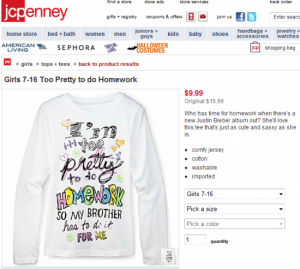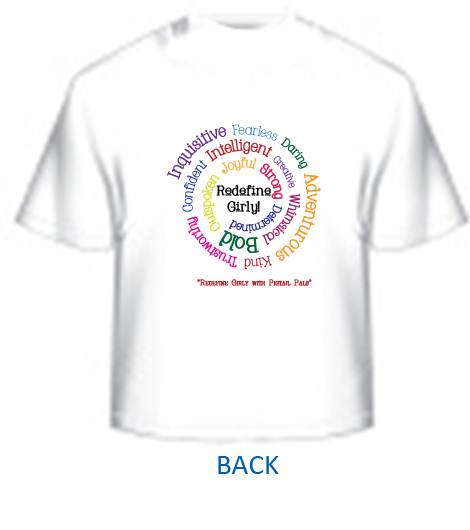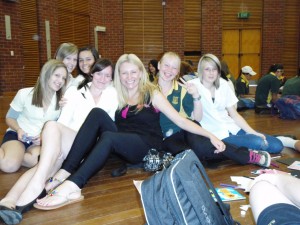Just like the all-knowing, ominous voices in Dicken’s A Christmas Carol, every festive season concerned commentators apparate to warn us about the imminent dangers of Christmas shopping for children- especially for little girls. Lego releases a new range of pink blocks for girls? Beware of buying into limiting gender stereotypes. Disney has launched a new pint-sized princess? Girls are doomed to a future of passivity and reliance on male rescuing. Your daughter wants a Bratz doll? Well you might as well give up right now.
Of course there are numerous toy ranges that are unarguably sexualised and adultified- everything from Baby Bratz in lingerie to scantily clad Vampire – wannabees courtesy of Monster High. Then there is the “tyranny” of pink; to peruse the girls’ aisles in the toy shop you would be forgiven for thinking little girls were cognitively unable able to respond to any colour that is not associated with sugar, spice and all things nice.
But while there are legitimate concerns, is the extent of the worrying all that proportionate? And is it actually productive?

As educators who work with young women, we know it is vital to give girls the skills to deconstruct the gender messages they receive along with their much-loved dolls. Cultural goods are not “values free” and there are certainly some questionable toys being marketed to our girls.
And yet, to listen to the rhetoric of how “toys are corrupting our children and destroying their innocence”, you would be forgiven for thinking that the toys had come to life- Toy Story style- and were now fiendishly plotting to hurt vulnerable, passive children. It is as though we have begun to think of the children as lifeless objects, being acted upon by toys, rather than the other way around.
As adult women, we have both admitted to each other (almost tentatively for fear of losing some feminist credibility) that as little girls we were bower-bird like in our pursuit for all that was shiny, pretty and pink. We adored our Barbies, were besotted by anything princess-like and suspect that were they around back then- we would have sold our little glittered-up souls for a Bratz. And yet like most women who ever played with Barbie, we somehow managed to turn out just fine.
So, instead of merely asking “what are toys doing to our children?”, we look at what children actually do with their toys.
The reality is that many children play in delightfully creative and often highly subversive ways. If you watch how girls actually play with Barbie they may well quite literally deconstruct her by pulling her arms off, chopping at her hair, or as we did, ignore the pretty pink Barbie Kitchen and instead drive her around in a makeshift car pretending she was building an empire.
Nor do little girls play at princesses by waiting poised for their prince to come and rescue them. Rather, girls use princess and fairy themed props to play at power. They order around servants. Right wrongs within their kingdom. Grant wishes. Four year old Snow White devotee Teyah was known as the “Gum-boot Princess” by her pre-school mates for under her princess gown she always wore sensible boots – all the better for stomping about to create order.
This is not to say, however, the toy aisles couldn’t do with an overhaul. But little girls we speak to say rather than give girls fewer options, we should be giving them more options by opening up the entire toy shop to all – regardless of gender.
“When you look in the girl’s aisle it’s all just pink, princess stuff…but the boys get fun building stuff, and puzzles and cars. I still don’t know why marbles, puzzles and mighty beans are in the boys aisles [and not the girls]” says nine year old Lucinda. “And you might think that black, blue and all dark colours are for boys but to me they are girl’s colours too. There are just things in this world called ‘colours’ and they don’t belong to anybody.”
It seems that raising healthy, well adjusted kids has less to do with the toys they play with and more to do with the values we instill them with. By teaching our children to think critically about cultural goods and by equipping them with skills to navigate complex cultural messages we will be empowering them for life.
Education-not panic- enables girls to see clearly, think critically, and reinvent their worlds.
What a fabulous gift to give to them.
This post was co-written with Nina Funnell. Nina is a social commentator and freelance opinion writer. She works as an anti–sexual assault and domestic violence campaigner and is also currently completing her first book on “sexting”, teen girls and moral panics. The post was first published by the Sydney Morning Herald 23/12/11.








 When the news hit that an American child beauty pageant company, Universal Royalty, is holding a pageant in Melbourne in July, I was amongst the many thousands of people who felt sickened—not just by the images of little girls being blatantly adultified and sexualised in these pageants but also by the fact that such a beauty competition for children would even have a market here in Australia.
When the news hit that an American child beauty pageant company, Universal Royalty, is holding a pageant in Melbourne in July, I was amongst the many thousands of people who felt sickened—not just by the images of little girls being blatantly adultified and sexualised in these pageants but also by the fact that such a beauty competition for children would even have a market here in Australia. Catherine Manning is an
Catherine Manning is an 





